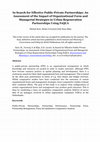Papers by erik hans klijn

RWS M. Anneeze (GPO) o.a. Contractmanager A6 Almere C. Naus (GPO) Portfoliodirecteur GPO, intern ... more RWS M. Anneeze (GPO) o.a. Contractmanager A6 Almere C. Naus (GPO) Portfoliodirecteur GPO, intern opdrachtgever Y. Norg (GPO) Contractmanager A9 GDW, Blankenburg-verbinding H. Ruijter (GPO) Programmadirecteur SAA J. Zeilmaker (GPO) Projectdirecteur A15 MaVa, Zeesluis IJmuiden W. Schat (GPO) o.a. Contractmanager A12 LuVe, Zeesluis IJmuiden Bouwbedrijven W van der Bijl (Fluor) A9 GDW A27 A1 L. Boender (Heijmans) Directeur assetmanagement infra R. Bos (Volker) 12 LUVE (EPC) A. van Broekhoven (Saaone) A1-A6 MTC J.W. Bruining (BAM) N31, N33, A12 LUVE (SPC), IJmond (EPC) R. Dirksen (Dura Vermeer) PPS-directeur P. de Heus (Fluor) A27-A1 (MTC) R.J. Feijen (Mobilis) A10 Coen (SPC) M. Gorgels (Fluor) A9 GDW en A27-A1 (SPC) J.Kempe (Saaone) A1-A6 (EPC) W. Korving (Rebel) A6, Afsluitdijk D. Laheij (Heijmans) PPS-directeur R. de Looff (Fluor) HSL (SPC, MTC) T. Lambert (Besix) Limmel MTC P. Martijn Flamink (BAM) N31 MTC M. Mulder (Besix) Limmel (EPC) A. Neumann (Hochtief) PPS-directeur S. van Royen (BAM) PPS-directeur M. Rijckevorsel (Boskalis) A1-A6 P. Schouten (Fluor) A9 GDW (EPC) J. van Steirteghem (Besix) A10 Coen (MTC) J. In het Veld (Rebel) Limmel. Beatrix (SPC) Financiële instellingen E. Koolhaas (DIF) A1-A6 (Bank/investeerder) M. Lunneker (Laing) A15 MAVA, A13-16 (SPC) P. Opperman (BNG) N31 (Bank/investeerder) F. Pankras (BNG) A9 GDW (Bank) T. Witjes (Laing) A6 (SPC) I. Verstraeten (KBC Bank) Limmel (Bank)
Public Management Review, 2020
This article analyzes the relation between leadership style of managers and the enforcement style... more This article analyzes the relation between leadership style of managers and the enforcement style of street-level bureaucrats. We also studied the influence of organizational culture. The analysis is based on a survey among 549 inspectors of the Food and Consumer Product Safety Authority (NVWA) in The Netherlands. Studying transactional leadership and servant leadership the findings show that contrary to the general assumptions in leadership literature the influence of leadership style on enforcement behaviour of inspectors is only very limited. Organization culture has more influence on how inspectors enforce rules in their interactions with inspectees.

Public Administration, 2019
In public–private partnerships (PPPs), the collaboration between public and private actors can be... more In public–private partnerships (PPPs), the collaboration between public and private actors can be complicated. With partners coming from different institutional backgrounds and with different interests, governing these partnerships is important to ensure the projects' progress. There is, however, little knowledge about the perceptions of professionals regarding the governance of PPPs. This study aims to exlore professionals' viewpoints about governing PPPs, and to explain potential differences using four theoretical governance paradigms. Using Q methodology, the preferences of 119 public and private professionals in Canada, the Netherlands and Denmark are explored. Results show four different viewpoints regarding the governance of PPPs. Experience, country and the public–private distinction seem to influence these viewpoints. Knowledge of these differences can inform efforts to govern PPPs and contribute to more successful partnerships.

Public Administration Review, 2018
Governments use different regulatory instruments to ensure that businesses owners or “inspectees”... more Governments use different regulatory instruments to ensure that businesses owners or “inspectees” comply with rules and regulations. One tool that is increasingly applied is disclosing inspectees’ performance information to other stakeholders. Disclosing performance information has consequences for street‐level bureaucrats because it increases the visibility of their day‐to‐day work. Using a survey (n = 507) among Dutch inspectors of the Netherlands Food and Consumer Product Safety Authority, this article shows that the disclosure of performance information has an impact on enforcement style at the street level. Findings show that perceived disclosed performance information positively enhances all three dimensions of street‐level bureaucrats’ enforcement style (legal, facilitation, and accommodation). This effect is strongest for facilitation and accommodation and weakest for the legal style. Perceived resistance by inspectees partly explains this effect. Contrary to expectations, m...
Public Management Review, 2018
Public-private partnerships (PPPs) are often regarded as the solution for time and budget overrun... more Public-private partnerships (PPPs) are often regarded as the solution for time and budget overruns in large infrastructural projects, but not all are successful. This raises the question of what really makes PPPs work. Focusing on the role of relational aspects, this article examines the degree to which trust and managerial activities correlate to the perceived performance and cooperation process in PPP projects. A multilevel analysis of survey data from 144 respondents involved in Dutch PPP projects shows that both trust and management correlate significantly to the perceived performance of these projects. Moreover, trust is associated with a good cooperation process.
Find the secret to improve the quality of life by reading this managing uncertainties in networks... more Find the secret to improve the quality of life by reading this managing uncertainties in networks public private controversies. This is a kind of book that you need now. Besides, it can be your favorite book to read after having this book. Do you ask why? Well, this is a book that has different characteristic with others. You may not need to know who the author is, how well-known the work is. As wise word, never judge the words from who speaks, but make the words as your good value to your life.

Environment and Planning C: Government and Policy, 2016
A public-private partnership (PPP) is an organizational arrangement in which knowledge and resour... more A public-private partnership (PPP) is an organizational arrangement in which knowledge and resources are pooled in order to realize outcomes. Although PPPs have become common practice in spatial planning and development, there is a continuous search for their ideal organizational form and management. This is fueled by the often poor performance in terms of e.g. time delays and budget overruns. Whilst comparative studies have been conducted into the outcomes of certain organizational forms and management strategies, fewer comparative studies evaluate their combined effects. The goal of this study is to explore what configurations of certain organizational forms and management may produce good outcomes. This is done by conducting a fuzzy set qualitative comparative analysis (fsQCA) of survey data of 50 managers involved in urban regeneration companies (URCs) in the Netherlands.
International Public Management Journal, 2015

Social innovation in the public sector has become an important focus for governments around the w... more Social innovation in the public sector has become an important focus for governments around the world over the last decade, as they try to solve intractable policy problems. The pressure on governments to do more with less in response to shrinking budgets and expanding community expectations and obligations has increased attention on how the public sector manages change and innovation. This heightened focus has created a need to understand the social innovation capacity of public sector environments. Work package 1 of the LIPSE project on social innovation, examined this for four municipalities in different nations. Document analysis of the organizational structure of the municipalities, a survey of administrators and politicians, and interviews with community-based innovators were used to gather information on the innovation capacity of the municipalities (Copenhagen, Rotterdam, Barcelona and West Lothian - adjacent to Edinburgh). Innovation capacity is related to the innovation en...
ABSTRACT Partijen die allianties vormen of een PPS aangaan, koesteren (onuitgesproken) verwachtin... more ABSTRACT Partijen die allianties vormen of een PPS aangaan, koesteren (onuitgesproken) verwachtingen over elkaar en van het project waarop de samenwerking betrekking heeft. Zo kunnen ze elkaar al dan niet vertrouwen. Omdat dergelijke verwachtingen medebepalend zijn voor een succesvol procesverloop, verdienen de vorming en verandering hiervan nadrukkelijk onze aandacht. Pogingen om verwachtingen te ‘managen’ kunnen vorm krijgen op het niveau van afzonderlijke partijen, bijvoorbeeld via beïnvloeding van de beeldvorming over en weer. Maar dergelijke pogingen kunnen zich ook juist richten op de onderlinge interactie, zoals wanneer afspraken worden gemaakt of spelregels worden vastgesteld. Bij het management van verwachtingen neemt de kans op succes toe als managers schijnbare tegenstellingen weten te overbruggen en zo in staat zijn tot dubbeldenken en dubbeldoen.
This article looks at how managers in large infrastructure projects in The Netherlands deal with ... more This article looks at how managers in large infrastructure projects in The Netherlands deal with difficult choices, which are labelled as dilemmas in this article, in their managerial activities. It presents the results of a survey of 32 managers in 18 complex decision-making projects in which public-private partnerships (PPPs) play an important role. The managers were presented with a number
European Political Science - EUR POLIT SCI, 2006

International Review of Administrative Sciences, 2014
Place marketing is increasingly used by local governments to enhance the image of cities and achi... more Place marketing is increasingly used by local governments to enhance the image of cities and achieve policy goals related to economic and spatial development. Place marketing has become part of local and regional governance processes. Critics have argued that place marketing is often applied in top-down ways that exclude citizens. Drawing on survey data this article empirically confirms this critique. But the article shows with a case study that citizen involvement in place branding can be used to enhance the quality of the brand and include citizens’ emotions in governance processes. Points for practitioners The influence of citizens on place marketing is generally low. Nonetheless, when citizens are given influence the effects of place marketing on spatial plans and other policies increases, according to respondents of this study. Place branding can be carried out interactively with citizens, and then be applied to include citizens’ emotions in governance processes. This may be us...

International Review of Administrative Sciences, 2008
This article looks at how managers in large infrastructure projects in The Netherlands deal with ... more This article looks at how managers in large infrastructure projects in The Netherlands deal with difficult choices, which are labelled dilemmas in this article, in their managerial activities. It presents the results of a survey of 32 managers in 18 complex decision-making projects in which public—private partnerships (PPPs) play an important role. The managers were presented with a number of choices and asked to rate the amount of attention they paid to each of the choices. The article focuses on four (groups of) dilemmas managers face in the inter-organizational context of these processes: (1) interaction with parties, (2) strategic orientation, (3) management style and (4) process dynamics.After a brief elaboration of the role of (network) managers in complex PPP projects and the nature of the dilemmas they face, the four groups of dilemmas are explored by looking at how managers scored on the dilemmas within each group. Conclusions are drawn about managers' perceptions of th...
Administration & Society, 2012
Drawing on different theories of democracy, this article distinguishes three dimensions of democr... more Drawing on different theories of democracy, this article distinguishes three dimensions of democratic legitimacy: political accountability, voice, and due deliberation. The article operationalizes each form of democratic legitimacy and then looks at how these various forms influence the outcomes in governance networks. The authors test this with a survey conducted in the first half of 2010 among respondents in environmental projects/water management projects ( n = 166). The analysis shows that democratic legitimacy in general has a significant positive effect on outcomes in governance networks and that voice and due deliberation have a much stronger impact than political accountability.
Administration & Society, 2010
Governance networks are characterized by complex interaction and decision making, and much uncert... more Governance networks are characterized by complex interaction and decision making, and much uncertainty. Surprisingly, there is very little research on the impact of trust in achieving results in governance networks. This article asks two questions: (a) Does trust influence the outcomes of environmental projects? and (b) Does active network management improve the level of trust in networks? The study is based on a Web-based survey of respondents involved in environmental projects. The results indicate that trust does matter for perceived outcomes and that network management strategies enhance the level of trust.

Uploads
Papers by erik hans klijn